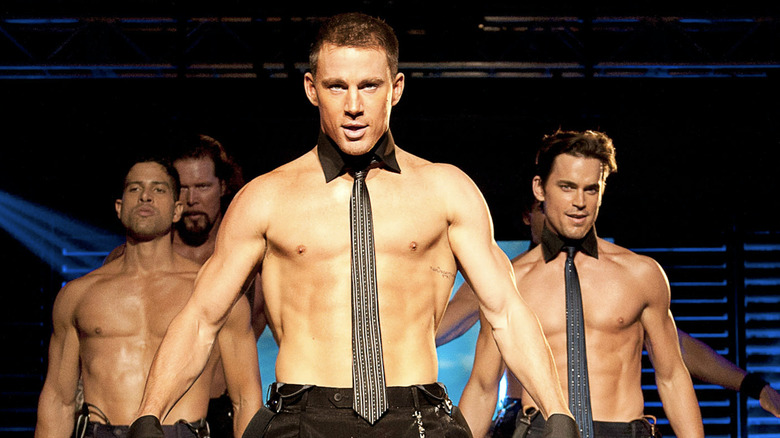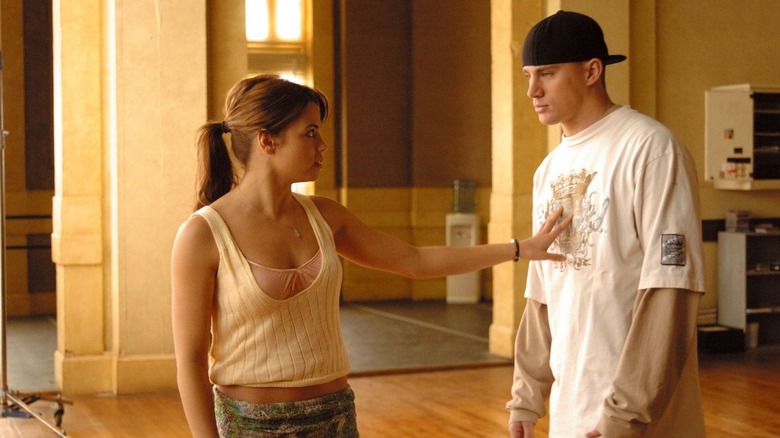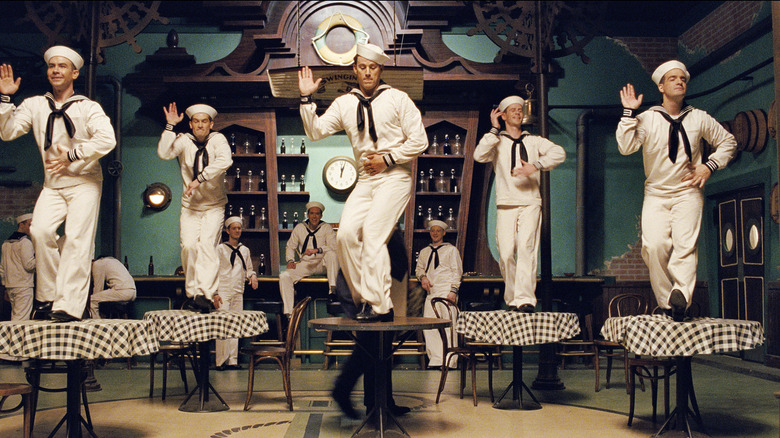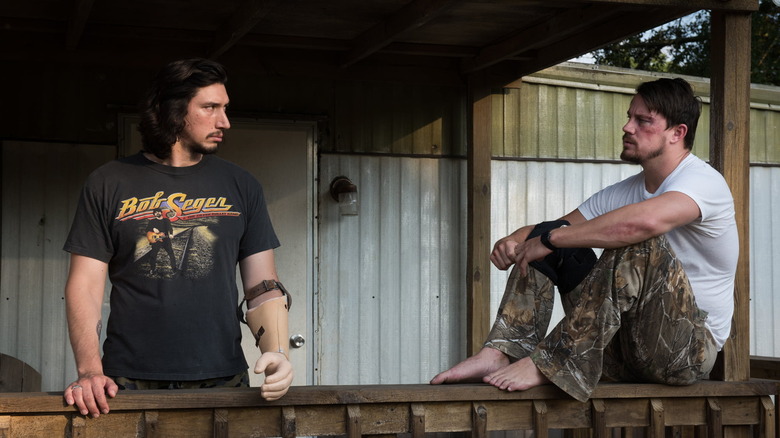The Enduring Appeal Of Channing Tatum
As a result of his forthcoming return to the silver screen after a short yet palpable absence, everyone is catching Channing Tatum fever. Perhaps more aptly, it appears that a collective appreciation for Tatum's varied career has resurged with the news that we're currently blessed with two Tatum joints — one currently in theaters and the other arriving imminently. There's "Dog" (which he co-directed with producing partner Reid Carlton), the tale of a military man with a troubled past and the war dog he must escort on a road trip to a funeral, and "The Lost City," a rom-com of seemingly epic proportions also starring Sandra Bullock and Daniel Radcliffe.
Though both films appear to be on opposite poles of the cinematic spectrum (a military movie vs. a chick flick), their draw rests solidly on the fact that Channing Tatum is so incredibly versatile. He is both uninhibited by and deeply in tune with his masculinity — there is no toxicity in his performance of gender as he uses his sex appeal and athletic physique to perform for a diverse audience. Tatum's ability to showcase his acrobatic talents is what essentially solidified his early career. However, his charming magnetism is what eventually transformed him into an incredibly marketable leading man across genres — his allure is always boosted when nimble choreography or a punchline is involved.
As such, it feels high time to delve into Tatum's most iconic roles, breaking down what each period of the actor turned director's filmography has entailed for audiences — a career that has effectively positioned him as one of the most enduringly adored actors of all time.
Athletic teenage heartthrob
When the actor first burst onto the scene as a fresh-faced 20-something, it was co-starring alongside Amanda Bynes in 2006's "She's the Man." Even then, Tatum's brawn (after all, he was voted "most athletic" on the heels of his 1998 high school graduation) is what landed him the role as Duke, the captain of the soccer team who begins to fall for Viola (Bynes). Of course, he's also completely unaware that Viola is disguising herself as her twin brother Sebastian to make a point about sexism in team sports, and "Sebastian" happens to play on the same team as Duke.
Even here, Tatum is unafraid to subvert masculine tendencies — he and Sebastian squeal when a roommate's pet tarantula is unleashed, hilariously spotlighting the myth of one gender's predisposition for eschewing arachnophobia. There's also the clear allusion to homoerotic urges, evident in Duke's eventual lust for Viola after getting to know his teammate Sebastian more intimately — he likes Viola precisely because she reminds him of someone he already knows, gender (and, you know, the fact that they're the same person) be damned. Importantly, he is also never branded as a meathead or a bully — even in his breakout role, he's a gentle giant, a characterization that continues to define his heartfelt himboism on-screen. Sure, he might always get the girl — but it never feels mean-spirited or gloat-y. Instead, it all relys on his characters to reveal their hearts of gold which lay just under their impeccable washboard abs.
This is where "Step Up" comes into play, with the Tatum-starring first installment releasing a few months after his breakthrough in "She's the Man." This film forever evinced the actor's robust dancing chops — expertise he gained working as a male stripper early during his career, but more on that later — putting him in close proximity with boy band hunks of the era, their chiseled handsomeness often accompanied by slick choreography. Yet Tatum's character in "Step Up" is once again restrained from occupying a position of power or dominance. After scheming with his friends to commit petty crimes, Tyler (Tatum) is sentenced to 200 hours of community service at a dance academy that he and his friends recently trashed after-hours — he becomes the de-facto teenage janitor and meets Nora (Jenna Dewan, who Tatum later married for nearly a decade). Of course, the two fall in love when an auspicious accident leaves Nora without a partner — luckily for her, Tyler is an amateur hip-hop dancer with serious promise.
"She's the Man" and "Step Up," released in the same year, would ultimately determine Tatum's career trajectory. For the next six years, he would star in a number of leading and supporting roles, with none of them quite penetrating the broader cultural lexicon in the same way. Sure, there was a cameo in Jon M. Chu's directorial debut "Step Up 2: The Streets," where he briefly reprises his role as Tyler, and the Nicholas Sparks adaptation of "Dear John" (you guessed it: he plays the titular John!) However, Tatum's broader appeal — particularly as a captivating actor and highly skilled dancer — wouldn't manifest for a few more years.
Dancing his pants off, literally
Let's face it: when we think of Channing Tatum, our minds are immediately filled with images of exotic dancing, and Genuwine's "Pony" becomes an unshakeable earworm. That's because the actor is still so closely tethered to the image he curated in the "Magic Mike" films — and for good reason, considering the films are loosely based on Tatum's own experiences as a stripper in Florida before he gained prominence through modeling and acting. His close collaboration with Steven Soderbergh on 2012's "Magic Mike" and its epic 2015 sequel "Magic Mike XXL" (directed by Gregory Jacobs) fuels the lifeblood of the series, which has quickly spawned into an HBO Max reality show, a live performance tour, and a forthcoming third installment.
Not only do the films flip the script when it comes to examining the cultural and financial industry that caters to women's sexual fantasies, but they position female eroticism as a glorious power to behold and satisfy. There are never any crude moments of misogynistic mockery — these men, including Magic Mike himself, take great pride in their work and their mission in allowing women to feel good about themselves. If that isn't a deeply feminist sentiment, then I'm really not sure what is. With the first two installments separated by a three-year gap, it's also evident that the feminism angle is ramped up in "XXL," which focuses on these adonises' sexual insecurities and the way that they find confidence through their stripping — also finding camaraderie and lasting lovers along the way.
Tatum takes this salacious dance spectacle one step further in the Coen Brothers' "Hail, Caesar!" Though he truly only shines for a nearly six-minute sequence, he imbues the performance-within-a-performance with both comedic charm and leggy limberness that totally channels a tongue-in-cheek Gene Kelly. Again, Tatum isn't remotely perturbed by the idea of challenging his own sexual proclivities, with the sailor-themed musical number "No Dames" certainly suggesting that while there will be no women for the crew to enjoy at sea, they will probably enjoy each other's company just fine. One particular moment finds Tatum wedged between the buttocks of two other sailors, hilariously trapped in a scenario no one seems particularly eager to remove themselves from. "No Dames" also involves a rare singing role for Tatum, which is surprisingly smooth and sweet for his lack of previous experience. His character of Burt Gurney is definitely evoking Gene Kelly intentionally (especially by way of his incredible tap dancing), but there's likely a reason why Tatum was such an immediate shoo-in for the role. His affable handsomeness and malleable masculinity fall right in line with Kelly's sensibilities — always the leading man, but never afraid to don tap shoes and culottes — a veritable showman archetype that feels lacking in contemporary Hollywood.
From studio fare to (more) Soderbergh
Sadly, we can't always see Tatum sporting eclectic dance styles and parading around in fun little outfits. But honestly, Tatum's more comedic-leaning commercial work contains just as much appeal as his racier, more suggestive stuff. There remains a bite of dark humor in "21 Jump Street," the 2012 remake of the iconic TV series of the same name which came out the same year as the first "Magic Mike" installment. Co-starring Tatum and Jonah Hill, there is also a reliance on physical comedy — a facet of entertainment that Tatum is well-versed in. Not only is the actor totally adept at making his hetero-macho appearance the perfect punchline, but the actor also demonstrates his commitment to taking down men who might try and emulate stereotypical patriarchal behavior by having his brand of clean-shaven, jock-influenced sexiness constantly take second-place to "unconventionally attractive" — but much more real — characters.
This is exemplified in the dynamic between his character, Greg, and Schmidt (Hill), who are both working undercover at a high school seven years after they both failed to attend their own senior proms. Unpacking alpha male Greg's worldly misconceptions alongside Schmidt's dismal self-confidence leads to both men forming a much more healthy attachment to themselves, completely obliterating the idea of high school cliques, coolness, and teenage conceits. The film's wokeness doesn't seem totally groan-inducing either, truly honing in on the fact that nowadays, you're a loser if you're not a politically conscious and informed adolescent — though as someone who graduated high school one year after this film was released, the anti-edginess crusade clearly didn't reach my New Jersey high school until a few years later.
In fact, Tatum and Hill also steal several scenes in 2014's "The Lego Movie," playing Superman and The Green Lantern, respectively. Though their buddy-cop antics in "21 Jumpstreet" (and "22 Jump Street" released in 2014 as well) boast fabulous chemistry between the two, their small yet mighty roles in "The Lego Movie" find the duo as unlikely adversaries. Well, actually, The Green Lantern adores Superman — who would rather voluntarily expose himself to Kryptonite than spend unnecessary time chit-chatting with his fellow superhero. The dynamic is always playful and does something different than what the pair have already explored in the "Jump Street" films, again proving Tatum's versatility and comfort with pushing seemingly set boundaries.
This is certainly reflected in the actor's work with Soderbergh, who immediately cast him in his two subsequent films after "Magic Mike" — both heralding decidedly dramatic departures for the actor. Though Tatum's role in "Side Effects" is somewhat minor — he plays the husband who Rooney Mara's character stabs to death while sleepwalking, a purported "side effect" of her new medication — it once again occupies this role of a man who is ultimately conquered by a woman. This is far less humorous and sexually charged than his previous work which entails this set-up but equally steeped in an inverted sense of dominance. Despite Tatum's domineering stature and hulking physicality, it seems he's all too easily able to be subdued — by love, by beauty, by women.
In "Logan Lucky," this woman happens to be Jimmy Logan's (Tatum) young daughter Sadie (Farrah Mackenzie), who is set to move away from their small West Virginia town with her mother Bobbie Jo (Katie Holmes) and stepfather Moody (David Denman). Jimmy and his brother Clyde (Adam Driver, who's equally hulking stature make him and Tatum impeccable co-stars) plan to stage a formidable heist at a local speedway to give the brothers a much-needed financial bail-out—which Jimmy hopes can help him move wherever his ex-wife and daughter go. This is perhaps Tatum's most impressive and layered performance to date, while also serving as his de-facto departure from acting for nearly four years. Since "Logan Lucky," Tatum took a role in a "Kingsman" sequel and a few voice-acting parts, but nothing has seriously stood out since. The truth is, two films the actor starred in from 2014 through 2015 are really what broke the camel's back, forcing him to take a step back and breathe for a few years, as he'd been overexerting himself physically and emotionally.
Return to the silver screen and sharing the director's chair
In a recent Variety profile, Tatum singles out the 2014 "22 Jump Street" sequel alongside the Wachowskis' 2015 sci-fi bomb "Jupiter Ascending" to have been particularly brutal for him to bear. During this short period, the actor starred in "22 Jump Street," "Jupiter Ascending," "Magic Mike XXL," and "Hail, Caesar!" He also took a small yet vital role in Quentin Tarantino's 2015 western "The Hateful Eight," as well as a voice role in the Mexican-set animated film "The Book of Life." Clearly, Tatum was working his butt off — a feat that produced some of his most well-lauded work, but also some of his most personally disappointing.
"I felt like I was the fat kid at the buffet, just working and working and working. I took four movies back to back without any time off. I wasn't as good as I wanted to be in those last two movies because I didn't have the energy."
While most would argue that "22 Jump Street" in particular is a perfectly fine sequel, there are few (but growing) defenders of "Jupiter Ascending" out there — but Tatum certainly isn't one of them.
"'Jupiter Ascending' was a nightmare from the jump. It was a sideways movie. All of us were there for seven months, busting our hump. It was just tough."
Having taken the time to truly unwind and reflect on what his artistic passions entail, Tatum has returned to the screen in 2022 with a truly stacked bill. Though he may have bitten off more than he could initially chew with "Dog," citing long working hours and the exhaustion of simultaneously directing and starring in a film, it's all but certain that we'll get the gender-norm-subverting, goofy himbo antics Tatum is so well-known for in "The Lost City," which already promises nudity and general naughtiness on Tatum's part. However, the actor made it clear that he would have liked the film to retain its original, much more raunchy title: "The Lost City of D." His response perhaps distills the essence of the actor's filmic interest far more astutely than I ever could have, though lord knows I'm more than happy just having tried:
"I wished they wouldn't have dropped the 'D.' You never drop the 'D.'"




